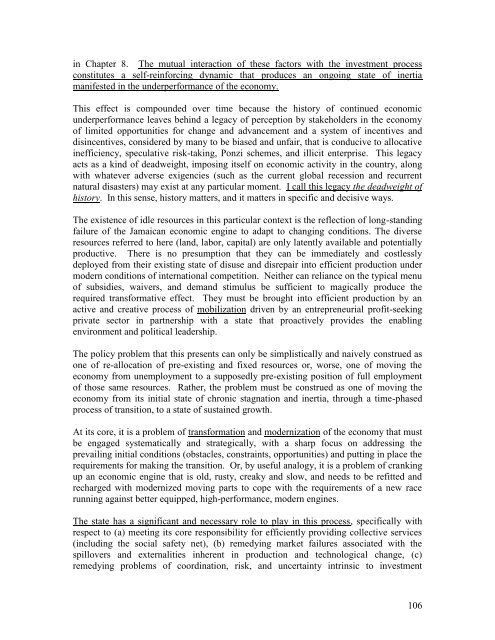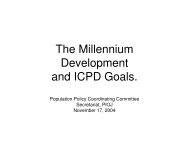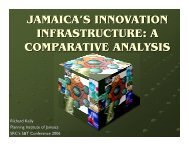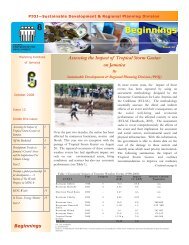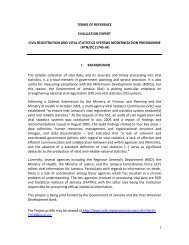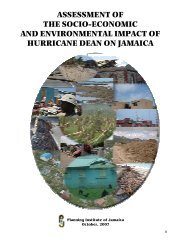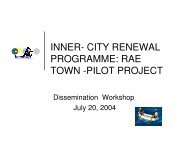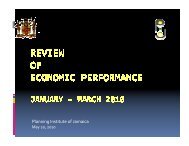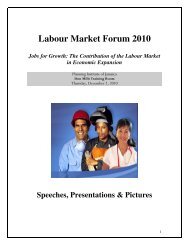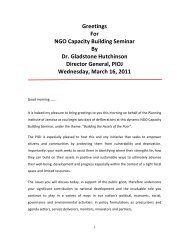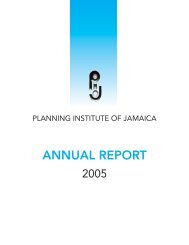PIOJ Growth-Inducement Strategy - Planning Institute of Jamaica
PIOJ Growth-Inducement Strategy - Planning Institute of Jamaica
PIOJ Growth-Inducement Strategy - Planning Institute of Jamaica
Create successful ePaper yourself
Turn your PDF publications into a flip-book with our unique Google optimized e-Paper software.
in Chapter 8. The mutual interaction <strong>of</strong> these factors with the investment process<br />
constitutes a self-reinforcing dynamic that produces an ongoing state <strong>of</strong> inertia<br />
manifested in the underperformance <strong>of</strong> the economy.<br />
This effect is compounded over time because the history <strong>of</strong> continued economic<br />
underperformance leaves behind a legacy <strong>of</strong> perception by stakeholders in the economy<br />
<strong>of</strong> limited opportunities for change and advancement and a system <strong>of</strong> incentives and<br />
disincentives, considered by many to be biased and unfair, that is conducive to allocative<br />
inefficiency, speculative risk-taking, Ponzi schemes, and illicit enterprise. This legacy<br />
acts as a kind <strong>of</strong> deadweight, imposing itself on economic activity in the country, along<br />
with whatever adverse exigencies (such as the current global recession and recurrent<br />
natural disasters) may exist at any particular moment. I call this legacy the deadweight <strong>of</strong><br />
history. In this sense, history matters, and it matters in specific and decisive ways.<br />
The existence <strong>of</strong> idle resources in this particular context is the reflection <strong>of</strong> long-standing<br />
failure <strong>of</strong> the <strong>Jamaica</strong>n economic engine to adapt to changing conditions. The diverse<br />
resources referred to here (land, labor, capital) are only latently available and potentially<br />
productive. There is no presumption that they can be immediately and costlessly<br />
deployed from their existing state <strong>of</strong> disuse and disrepair into efficient production under<br />
modern conditions <strong>of</strong> international competition. Neither can reliance on the typical menu<br />
<strong>of</strong> subsidies, waivers, and demand stimulus be sufficient to magically produce the<br />
required transformative effect. They must be brought into efficient production by an<br />
active and creative process <strong>of</strong> mobilization driven by an entrepreneurial pr<strong>of</strong>it-seeking<br />
private sector in partnership with a state that proactively provides the enabling<br />
environment and political leadership.<br />
The policy problem that this presents can only be simplistically and naively construed as<br />
one <strong>of</strong> re-allocation <strong>of</strong> pre-existing and fixed resources or, worse, one <strong>of</strong> moving the<br />
economy from unemployment to a supposedly pre-existing position <strong>of</strong> full employment<br />
<strong>of</strong> those same resources. Rather, the problem must be construed as one <strong>of</strong> moving the<br />
economy from its initial state <strong>of</strong> chronic stagnation and inertia, through a time-phased<br />
process <strong>of</strong> transition, to a state <strong>of</strong> sustained growth.<br />
At its core, it is a problem <strong>of</strong> transformation and modernization <strong>of</strong> the economy that must<br />
be engaged systematically and strategically, with a sharp focus on addressing the<br />
prevailing initial conditions (obstacles, constraints, opportunities) and putting in place the<br />
requirements for making the transition. Or, by useful analogy, it is a problem <strong>of</strong> cranking<br />
up an economic engine that is old, rusty, creaky and slow, and needs to be refitted and<br />
recharged with modernized moving parts to cope with the requirements <strong>of</strong> a new race<br />
running against better equipped, high-performance, modern engines.<br />
The state has a significant and necessary role to play in this process, specifically with<br />
respect to (a) meeting its core responsibility for efficiently providing collective services<br />
(including the social safety net), (b) remedying market failures associated with the<br />
spillovers and externalities inherent in production and technological change, (c)<br />
remedying problems <strong>of</strong> coordination, risk, and uncertainty intrinsic to investment<br />
106


